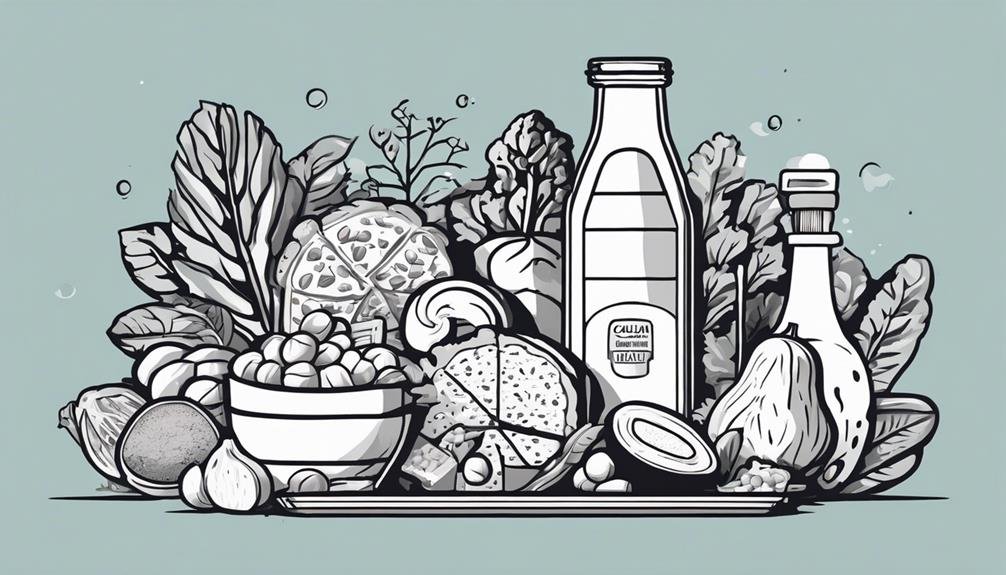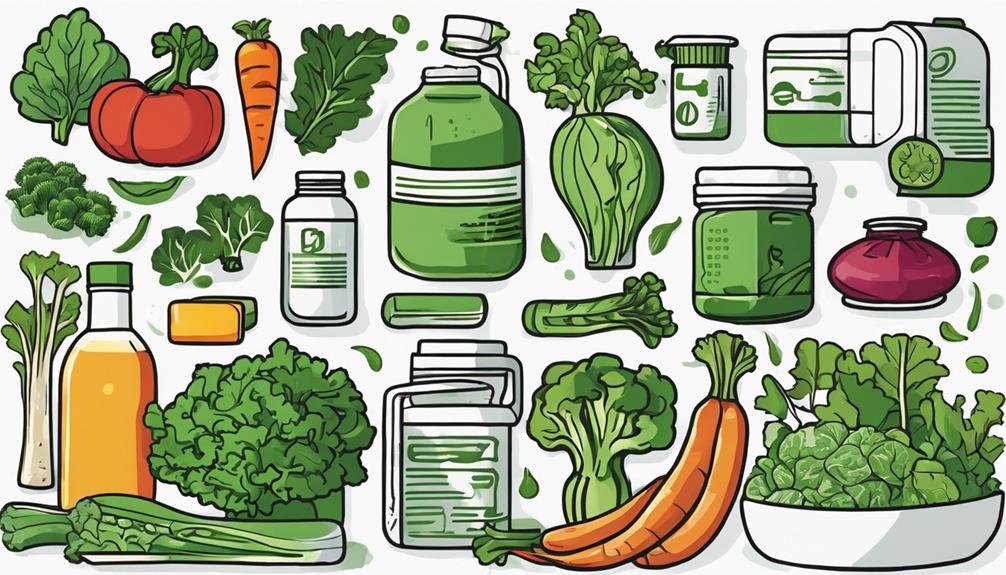As you ponder the intricate balance required for optimal bone health, consider the pivotal role dietary supplements can play in fortifying your skeletal foundation.
The top seven supplements identified for enhancing bone health offer a strategic blend of essential nutrients designed to support bone formation and strength.
Each supplement brings a unique contribution to the table, working in tandem to bolster your skeletal resilience.
As you explore the benefits of these key players, you'll uncover a wealth of insights into nurturing your bones for a vibrant and active future.
Key Takeaways
- Adequate intake of calcium and vitamin D is crucial for strong bones and teeth.
- Magnesium and zinc play vital roles in bone density and formation.
- Vitamin K and boron are essential for bone metabolism and mineral density.
- Including isoflavones in the diet can improve bone mineral density, especially for postmenopausal women.
Calcium

Calcium, an essential mineral for building and maintaining strong bones and teeth, plays a crucial role in various bodily functions beyond bone health. Adequate calcium intake is vital for muscle function, nerve transmission, and hormonal secretion. While calcium is commonly associated with bone health, its benefits extend to overall well-being.
To ensure optimal bone health, adults typically require 1000-1300 mg of calcium daily. Incorporating calcium-rich foods like dairy products, leafy greens, and fortified foods into your diet is key. In cases where dietary intake may be insufficient, calcium supplements can be beneficial.
Osteoporosis, a condition characterized by weakened and brittle bones, can result from inadequate calcium levels over time. By meeting your daily calcium needs through both diet and supplements if necessary, you can support strong bones and overall health. Remember, your body relies on this essential nutrient for more than just bone strength.
Vitamin D
Crucial for optimal bone health and overall well-being, Vitamin D plays a vital role in calcium absorption and bone remodeling. Adequate levels of vitamin D are essential for maintaining bone density and strength, as well as reducing the risk of fractures. While sunlight is a natural source of vitamin D, deficiency can occur due to limited sun exposure or inadequate dietary intake. In such cases, supplementation becomes necessary to meet the daily requirements, typically ranging from 600-800 IU.
Including vitamin D-rich foods like fatty fish, eggs, and fortified products in your diet can help boost your vitamin D levels. For individuals who struggle to obtain enough vitamin D through natural sources, supplements can be a convenient and effective way to ensure optimal bone health. Regular intake of vitamin D not only supports calcium absorption but also contributes to overall bone health, reducing the likelihood of fractures and promoting bone strength.
Vitamin K

To support optimal bone health and reduce the risk of fractures, consider the essential role that Vitamin K plays in bone metabolism and the formation of new bone tissue.
Vitamin K is crucial for maintaining bone mineral density and reducing fracture risk. Leafy greens such as kale, spinach, and broccoli are rich sources of this vital vitamin. A deficiency in vitamin K can impair bone formation and increase the likelihood of fractures.
If your dietary intake is insufficient or if you have certain health conditions affecting bone health, supplementation with vitamin K may be beneficial. Ensuring an adequate supply of vitamin K through either dietary sources or supplements can contribute to overall bone health and help in the prevention of fractures.
Make sure to include vitamin K-rich foods in your diet to support your bone health and consider consulting a healthcare provider for personalized recommendations regarding vitamin K supplementation.
Magnesium
Support your bone health by ensuring an adequate intake of magnesium, a crucial mineral that plays a vital role in maintaining bone density and strength through its assistance in calcium absorption. Daily recommendations for magnesium intake fall between 310-420 mg for adults, with higher amounts required during pregnancy and lactation.
Magnesium-rich foods such as nuts, seeds, whole grains, and dark leafy greens like spinach can help you meet your daily needs. This mineral is essential for regulating calcium levels in the body, thereby preventing bone-related conditions like osteoporosis.
A deficiency in magnesium can lead to decreased bone density, underlining the significance of meeting the recommended daily intake for optimal bone health. By incorporating magnesium-rich foods into your diet or considering supplementation if needed, you can support your bones and overall well-being.
Zinc

Zinc is a critical mineral essential for bone health, aiding in bone formation and density maintenance.
To support optimal bone health, it's important to include zinc-rich foods like meat, shellfish, legumes, nuts, and seeds in your diet.
Following the recommended daily intake of around 8-11 mg of zinc for adults can help prevent bone-related disorders and maintain strong bones.
Zinc Benefits Bones
Playing a vital role in collagen synthesis, zinc contributes significantly to the formation and repair of bones. Adequate zinc levels are essential for maintaining optimal bone density and strength, promoting overall bone health. Zinc deficiency can impede bone growth and development, potentially leading to weakened bones. Supplementing with zinc may be beneficial for individuals with low dietary intake or absorption issues, ensuring proper bone structure and function.
Research indicates that zinc plays a crucial role in supporting bone health and integrity. Make sure to include zinc-rich foods in your diet to help maintain healthy bones and prevent any deficiencies.
- Ensure adequate zinc levels for optimal bone density and strength.
- Address low dietary intake or absorption issues with zinc supplementation.
- Support overall bone health by incorporating zinc-rich foods into your diet.
Zinc-Rich Foods
To enhance your bone health and ensure adequate zinc intake, consider incorporating zinc-rich foods like oysters, beef, pumpkin seeds, and chickpeas into your diet. Zinc is a crucial mineral for bone formation and maintenance. Including these foods in your meals supports proper bone mineralization, which is essential for bone strength and structure.
Adequate zinc intake also helps in preventing bone loss and reducing the risk of fractures. If your diet lacks zinc, it may lead to impaired bone growth and overall bone health. By incorporating zinc-rich foods, you can contribute to the enhancement of your bone health and ensure that your bones remain strong and healthy in the long run.
Zinc Dosage Guidelines
For optimal bone health and overall well-being, consider following recommended daily zinc intake guidelines tailored to your age, gender, and specific health conditions.
Here are some key points to keep in mind:
- Recommended Intake: Adults typically need around 8-11 mg of zinc daily, but this can vary based on individual factors.
- Role in Bone Health: Zinc is crucial for collagen synthesis, essential for bone formation and repair.
- Importance of Optimal Levels: Adequate zinc levels support proper bone growth and development, making it a vital nutrient for overall bone health.
Ensuring you meet your zinc requirements through dietary sources like meat, shellfish, and legumes or considering zinc supplementation when necessary can help maintain optimal levels and support your bone health journey.
Boron

Boron is a trace mineral crucial for enhancing calcium absorption and supporting bone formation. Consuming 1-3 mg of boron daily is recommended to optimize bone health benefits.
Sources like nuts, avocados, and dried fruits provide natural ways to incorporate boron into your diet.
Boron Benefits Bone Density
How does boron enhance bone density and support optimal bone health?
Boron aids in calcium absorption and increases bone mineral density, ultimately promoting bone formation and strength. By incorporating boron into your diet, you can potentially prevent osteoporosis and improve overall bone health. To ensure optimal bone density, aim for a daily intake of 1-3 mg of boron. You can find this essential mineral in a variety of foods such as nuts, avocados, legumes, and raisins. Embrace the power of boron to fortify your bones and maintain strong skeletal structure for a life of freedom and vitality.
Boron Benefits for Bone Density:
- Enhances calcium absorption
- Increases bone mineral density
- Supports bone formation and strength
Boron Aids Bone Health
To further understand the impact of boron on bone health, it's essential to recognize its role in enhancing calcium absorption and contributing to bone formation. Boron, a mineral crucial for optimal bone health, aids in the absorption of calcium and magnesium, essential minerals for bone strength.
While boron is naturally present in foods like nuts, avocados, and raisins in small amounts, a daily intake of 1-3 mg is recommended to support bone health. Research indicates that boron supplementation may further enhance bone health, although more studies are necessary to confirm its full benefits.
Considering adding boron-rich foods to your diet or discussing boron supplementation with a healthcare provider to potentially improve your bone health.
Isoflavones
Incorporating isoflavones from soy-based foods into your diet can potentially benefit bone health, particularly in postmenopausal women due to their estrogen-like effects that improve bone calcium retention. Isoflavones, found in soy products like tofu and soy milk, have been linked to improved bone mineral density in research studies, making them a valuable dietary addition for maintaining bone health.
While the evidence on their direct impact is mixed, isoflavones are known for their anti-inflammatory properties, which can contribute to overall bone health. Including soy-based foods in your diet provides a natural way to introduce isoflavones, potentially offering benefits for your bones. So, consider adding these soy products to your meals to support your bone health journey.
- Enhance Bone Density: Isoflavones may help improve bone mineral density, especially beneficial for postmenopausal women.
- Anti-Inflammatory Benefits: Isoflavones are recognized for their anti-inflammatory properties, which can support overall bone health.
- Natural Dietary Inclusion: Incorporating soy-based foods into your diet is a simple way to introduce isoflavones for potential bone health advantages.
Frequently Asked Questions
What Is the Best Supplement to Strengthen Bones?
To strengthen bones, focus on adequate calcium intake, essential for bone health. Vitamin D aids calcium absorption. Incorporate a balanced diet, exercise, and consider magnesium, omega-3, zinc, protein, and vitamin K for optimal bone strength.
What Is the Fastest Way to Increase Bone Density?
To increase bone density quickly, focus on weight-bearing exercises, vitamin D from sunlight or supplements, and a nutrient-rich diet for optimal calcium absorption. Lifestyle changes such as exercise routines and dietary habits support bone health effectively.
What Can I Take to Improve Bone Health?
To improve bone health, try incorporating yoga poses, resistance training, weight-bearing exercises, and a balanced diet rich in green vegetables and omega-3 fatty acids. Consider vitamin D, magnesium intake, collagen supplements, and regular check-ups for optimum bone strength.
How to Get 1200 Mg of Calcium a Day From Food?
To get 1200 mg of calcium daily from food, consume dairy products, leafy greens, nuts, fortified foods, seafood with bones, vitamin D sources, calcium-rich fruits, whole grains, and legumes. Incorporate these options for optimal bone health.
Conclusion
In conclusion, incorporating the top seven dietary supplements for bone health can greatly benefit your overall well-being. These supplements include calcium, vitamin D, vitamin K, magnesium, zinc, boron, and isoflavones. They aid in bone formation, density, and mineralization, reducing the risk of osteoporosis and fractures.
Remember, a balanced approach to bone health is key. Consider adding these supplements to your daily routine for stronger and healthier bones. With these supplements, you'll be on your way to bone health that's as strong as steel!
